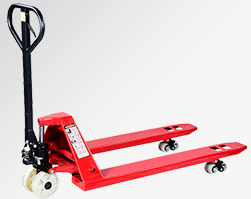News Details
What are the advantages of using manual hydraulic transport vehicles in timber factories
In the wood processing industry, manual hydraulic handling vehicles have become the preferred equipment for material handling in workshops due to their unique advantages. This seemingly simple tool has demonstrated multiple benefits in practical applications that far exceed manual handling, bringing significant operational improvements to timber production enterprises.
Manual hydraulic handling vehicles demonstrate extremely high cost-effectiveness. Compared to automation equipment such as electric forklifts, its procurement cost is only about one tenth of the former, and maintenance costs are significantly reduced. The equipment has a simple structure and low failure rate. It only requires regular replenishment of hydraulic oil and inspection of wheel wear on a daily basis. This low-cost feature is particularly suitable for small and medium-sized wood processing enterprises, helping them achieve mechanization of handling within limited budgets.

Wood itself is heavy and has sharp edges, and manual handling can easily cause work-related accidents such as scratches and injuries. After using hydraulic handling vehicles, workers only need to operate the handle to complete heavy object handling, greatly reducing the chance of direct contact with dangerous goods. The mechanical braking system equipped with the equipment can reliably lock the cargo position and prevent the occurrence of rolling accidents. The roller design at the front end of the fork makes loading wood smoother and safer.
No professional training is required, ordinary workers can proficiently use it with simple guidance. The ergonomically designed handle integrates lifting, steering, and control functions, making operation intuitive and convenient. The equipment has flexible steering and a small minimum turning radius, making it easy to navigate in narrow spaces commonly found in timber workshops. This ease of use significantly reduces the training costs and time for enterprises.
After using hydraulic transport vehicles, the efficiency of wood handling can be increased by 3-5 times. Workers no longer need to expend physical energy on repetitive handling actions, and can focus their energy on more skilled processing procedures. The logistics in the workshop are smoother, reducing waiting time between processes and significantly improving overall production efficiency.
The environmentally friendly and energy-saving characteristics make manual hydraulic transport vehicles conform to modern manufacturing concepts. Completely relying on manual hydraulic drive, without consuming electricity or fuel, achieving zero emissions. Silent operation will not increase workshop noise pollution, and there will be no harmful waste generated during maintenance. This green and environmentally friendly characteristic makes it an ideal choice under the concept of sustainable development.

